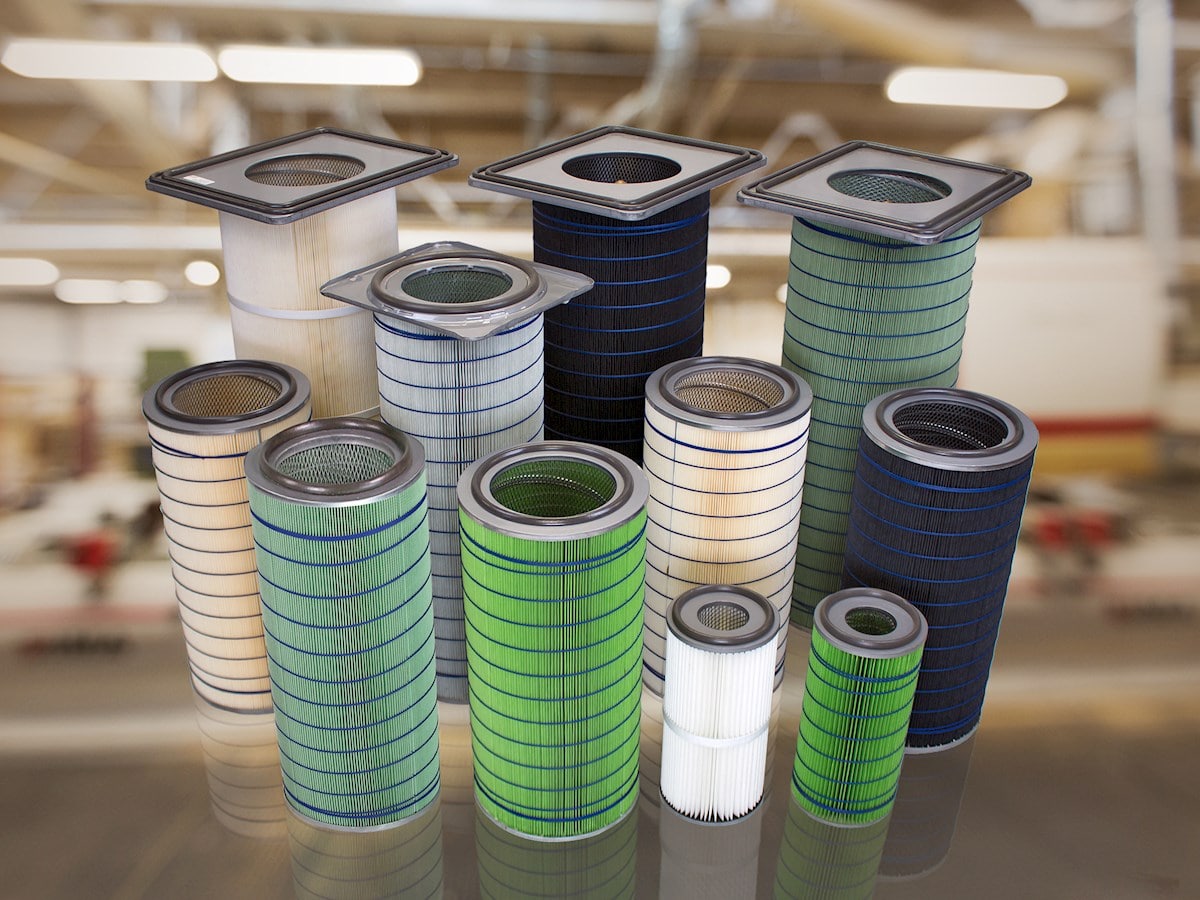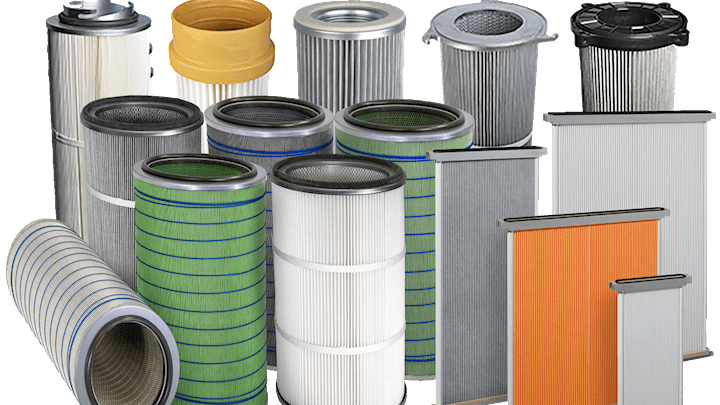Almost all industrial manufacturing processes generate emissions in form of dust, fume, smoke or mist. These emissions need to be captured from the process before they are released into the ambient air and spread to the workspace. Using a well-balanced extraction system provides the needed protection for employees, combined with an efficient filtration equipment that will yield low energy consumption and supports preservation of the environment.


Filter elements for industrial extraction systems
Filter elements are the integral component of any dust collector or mist separator and affect the separation efficiency as well as the energy efficiency of the entire extraction system. Camfil´s high-quality filter elements are available with different filter media, each providing special properties to ensure best filtration performance on various applications and emissions as well as an optimised filter life.
Also available: retrofit filters in different length, diameters and with different flanges to perfectly fit into the most common industrial dry dust and fume extraction systems on the market.
Consultation is a matter of trust
We would be glad to get to know you personally in an initial consultation or at an on-site appointment to learn more about your specific manufacturing processes, the emissions to be extracted and the installation environment in your facility. Based on this information, we will provide you with a non-binding tailor-made offer for one of our extraction systems that meets the requirements of the respective application. Ask us!
Dry filtration solutions are used in different industries such as metalworking, food and beverage or pharma and perform on a wide variety of challenging industrial applications, handling harmful, combustible dust and fumes including fine, fibrous, abrasive or heavy dust loads.
The so called dust and fume collectors are cleanable filtration solutions which are mostly used when the concentration of the air pollution in a facility is at or above 0.05 mg/m³ and a stationary filter leads to short filter life.
Dry dust and fume collectors utilise filter elements to separate airborne particles from the airstream. The filters get cleaned by a pulse of compressed air and the particles are discharged to a collection bin.
Camfil´s dust and fume extraction systems provide a near-limitless variety of configurations and airflow capabilities which is why the units are easily adaptable to specific work environments and spatial conditions. For example, the dust collectors can be tailored with optional explosion protection or containment systems in order to provide the necessary required safety.
Wet filtration is mostly used on industrial processes which release dust and other particles that are difficult or impossible to handle with dry filtration solutions like explosive, combustible, sticky or fibrous dusts.
While dry dust and fume collectors are equipped with filter elements to collect particles from the airflow, wet filtration systems use water as filter media. The functional principle of the so called wet scrubbers make use of the principle of mass inertia, through which the particle-laden process exhaust air is integrated into fine water droplets, thereby increasing the mass of the particles and thus safely separated. Afterwards the cleaned air can be returned back into the production or out of the facility. The collected waste water and the filtered solid substances have to be divided and disposed of correctly via appropriate waste streams.
Wet scrubbers can be classified according to design features or method of liquid feed. The selection of the scrubber type is application-specific and depends on the required air volume, the pollutants to be separated, the particle size and the dust load in the process exhaust air.
Camfil offers Venturi and Vortex wet scrubbers. Whereas Venturi scrubbers are the best solution to handle fine particles with high dust loads, Vortex scrubbers are used to remove coarse particles with light to medium dust loads from exhaust gas streams.
Depending on the application and the processed material, machine tools use different liquids as emulsion, oil or MQL for cooling the tools within the machine, to clean the workpiece during the processing procedure or for chip disposal. As those metalworking fluids are injected with high pressure together with the speed of the tools, the fluids vaporise and create coolant mist inside the working area of the machines.
Before opening the doors for changing tools or workpieces, the coolant mist has to be extracted from the working area of the machine. This is mandatory to protect the workers occupational health, to eliminate safety risks and to control the indoor air quality.
Machining mist collectors can be used as centralised or decentralised extraction solutions or for direct machine tool integration. Due to the latest filter technologies, Camfil´s industrial mist collectors combine the advantages of filtering separators and coalescence separators and provide best filtration efficiencies together with low energy consumption and long filter lifetimes.

Did you know Camfil have a full range of retrofit filters that can be utilised in all the most common brands on the market. Camfil filters are not just designed to work but to optimise your dust extraction systems performance
Manufacturing and machinery Energy and Power Systems Dust fume and mist extraction Food and beverage Life science and healthcareCamfil provides fully tailored turnkey solutions for exhaust air applications that meet the specific demands of your processes and local regulatory requirements. From a single unit to a complete plant-wide system, including dust, fume and mist extraction as well as molecular filtration.
Manufacturing and machinery Dust fume and mist extraction Food and beverage Life science and healthcareLearn more on how Camfil´s GoldLink Connect remote monitoring system helped a metalworking company to significantly reduce power consumption and compressed air consumption on their dust collectors.
Camfil´s Gold Series dust collector allows French life science company significant savings on energy costs and to safely handle ST1 explosive dust from carding process of alginate fibers.
Hybrid solution: Extracting process dust from five tableting machines as well as dust from a central vacuum system with 7 high vacuum extraction points with a single dust collector.
Often the initial purchase price for air filters or dust collectors is just the tip of the iceberg. The true costs for energy, maintenance and disposal are lurking below the surface. To make the most economic decision in the long-run, a detailed calculation considering all the factors will help to reduce your overall expenditure.
This case study highlights the safe handling of combustible food dust with ATEX regulation compliance and increased savings.
Processes in manufacturing facilities often generate dust and fumes which for example can pose health risks for your operators or compromise the quality and safety of your products. Determining the right capture and filtration solution helps to protect against the main risks of uncontrolled emissions and thus to create safe work environments.
Austrian metalworking company turned to Camfil because they were not satisfied with the performance of their existing extraction system. Camfil´s Gold Series X-Flo dust & fume collector equipped with Dura-Pleat filter cartridges now provides a highly reliable solution for their 24/7 operation while reducing costs for filter replacement and maintenance.
When purchasing dust collection systems and filter cartridges, the initial purchase price is just the tip of the iceberg. The true costs – energy, consumables and operations – are lurking below the surface. The good news is that there are ways to reduce these costs over the long term.
Laser cutting, plasma cutting and oxy-fuel cutting are different machining processes used in the metal producing and metalworking industries, using energy in various forms to cut virtually any shape from iron and nonferrous materials out of sheets or large slabs. During the processes, the materials heat up, melt and cause harmful emissions. If not controlled properly, this airborne dust and fumes pose health risks for operators and cause damage to machinery.
Dust collection systems are an important part of any manufacturing process, so they need to be sized and designed properly. One critical design component is specifying the proper filtration media, which requires analysis of the dust in the process and all operating conditions.
HemiPleat is, in short, the uniquely, patented media pleating technology Camfil use to create highly efficient filter cartridges that outlast and outperform competitors alternatives.
Dust collection systems are all safety devices and thus state-of-the art modern methods of validation and certification are required. Furthermore it is vital to ensure that the system is still in compliance after perhaps changed process conditions, to provide maximum safety for personnel and the facility. It is also recommended to carry out quality audits, process reliability surveys and annual safety inspections.
Though tablet compression does not generate large volumes of fugitive dust, safe and efficient collection of whatever dust is created by this process is critical. The dust collector linked to the press can contribute to reliable, consistent performance – or detract from it, if components are not properly designed.
Almost all industrial manufacturing, processing or packaging applications generate dust as a side effect. Many of these dusts are both combustible as well as explosive, and removing them from the work place can significantly reduce the risk of serious accidents. It is estimated that there are approximately 2,000 dust explosions in Europe annually. Most of these are minor but some are very destructive. So by extracting the dust, the risk in the production is reduced, but unless the extraction system is safe the risk is just moved.
Active Pharmaceutical Ingredients (API´s) create a number of challenges for pharma manufacturers and their production processes. The API’s create very fine dusts and often high solvent concentrations during the product handling and manufacturing processes. This fine dusts pose the greatest risk to the worker’s health, with harmful particles being retained in the lungs. That´s why effective filtration is required combined with containment solutions to ensure the dust doesn’t escape during normal operation as well as during routine maintenance like filter changes or waste dust disposal.
In many instances, pharmaceutical and chemical manufacturing involves the handling and processing of powder or granular ingredients, many of which have exposure or explosion risks attached when in dust form. A comprehensive risk assessment of each and every application is essential before evaluating the appropriate dust control solution.
To mitigate exposure and explosion risks in pharmaceutical workspaces, you have to fully understand the application and the processed ingredients. Dust testing and a hazard analysis will provide more specific information about particle size and explosive properties of your dust and thereby to determine the right extraction solution for your needs.
Not all people who purchase our products are experts in air filtration and they shouldn’t have to be either. The purpose of Camfil City is to give everyone a chance to learn the basics of what our clean air solutions can do for them.
A properly designed and installed dust collection system will effectively catch, convey and separate hazardous and nuisance dusts. Our new ePoster pinpoints key areas to watch and signs to look for that will help you avoid problems with your dust collection system and to keep up process availability in your production facility.
Dust collectors are necessary safety systems in many manufacturing and processing plants, thus as in the food processing industry. But if they are not designed, installed and maintained properly, these systems themselves can cause serious problems. In this eBook we highlight 10 ways how to make sure your dust collection system is up to the tasks of keeping workers safe, maximising production uptime and meeting regulatory compliance.
The potential for a combustible dust explosion is a reality in any industrial manufacturing facility. But operations with processes that generate combustible metal dusts are especially at risk and require special consideration when selecting an equipment supplier. Camfil´s new eBook lists seven important considerations for determining whether a dust collector equipment supplier has the knowledge necessary to keep your operation safe and compliant.
Dyna Mig had a competitor dust collector solution that regularly caused costly downtime. With the help of Camfil’s expertise and a flagship Camfil Gold Series GSX dust collector system, Dyna Mig was able to eliminate all unscheduled downtime and cut their heating costs to a minimum – as well as work safer.
Metalworking facilities must be diligent in controlling harmful dust and fumes, especially those that contain harmful metal particulates from processes such as welding, thermal cutting, sanding and polishing. To better understand what should be considered when handling dust and fumes in metal processing we have created an ebook with 7 tips as a free download.
These airborne particles of metalworking fluids must be extracted directly from the work area to avoid spreading to the ambient air when opening the doors of the tooling machine.
Handling dust produced due to sugar can be challenging as it is explosive, sticky and abrasive. In this facility, the customer produces soft gummy sweet sugar coated candy and required an efficient and reliable dust extraction solution for a new packaging line.
Welding, grinding and laser/plasma cutting processes produce huge amounts of fine PM1 particles and various harmful gases that cannot be removed from the indoor air by ventilation alone.
G-CON Manufacturing, a mobile cleanroom provider, and Camfil recently partnered to provide their leading-edge technologies together to meet the needs of a well-known pharmaceutical customer.